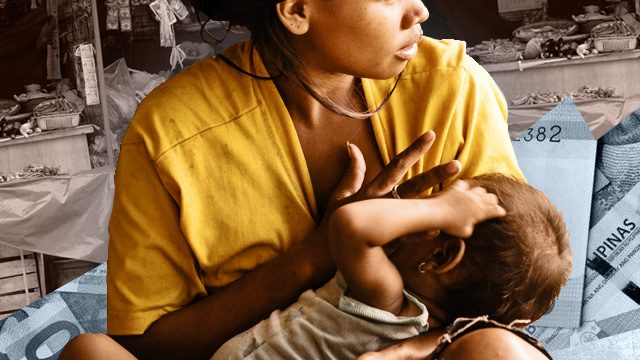SUMMARY
This is AI generated summarization, which may have errors. For context, always refer to the full article.

MANILA, Philippines – With consumer prices rising the fastest in over 3 years, the National Economic and Development Authority (NEDA) said it is high time for the government to intervene and implement measures that will cushion the impact of inflation on poor households.
NEDA on Tuesday, March 6, said these measures include expansion of the government’s conditional cash transfer program called the Pantawid Pamilyang Pilipino Program (4Ps) as well as faster distribution of the unconditional cash transfer of P200 per month in response to the Tax Reform for Acceleration and Inclusion (TRAIN) law.
Socioeconomic Planning Secretary Ernesto Pernia also reiterated the call to replace the quantitative restriction (QR) on rice with tariffs, which is seen to lower rice prices and increase revenues for agricultural programs like crop diversification.
“These measures will ensure better stability in the prices of food items and maintain or raise the purchasing power of the bottom 30% of households,” Pernia said in a statement, in reaction to the February inflation.
Using the 2006 base index, the Philippine Statistics Authority (PSA) said inflation last month rose to 4.5%, the fastest in over 3 years. Higher prices of food, drinks, and tobacco were the biggest factors behind the jump. (READ: Philippine inflation hits new 3-year high at 4.5% in February)
Citing data released by the PSA, University of the Philippines (UP) Diliman School of Statistics dean Dennis Mapa pointed out that the inflation experienced by the bottom 30% of households surged to 4.80% in January this year, from 3.60% last December.
The PSA has not released the February 2018 inflation rate for the bottom 30% yet as of posting.
Tax reform impact
According to the Department of Finance (DOF), the TRAIN law had no impact on inflation.
The Bangko Sentral ng Pilipinas (BSP), meanwhile, said rice prices in February went up “due to the end of the main harvest season.” The central bank also said “year-on-year fish inflation remained elevated in February owing to some tightness in domestic supply with the fishing ban in the Visayas area.”
But for Mapa, the high inflation rate being experienced by all households, especially the poor, is partly because of the “direct and indirect impacts” of the newly-implemented tax reform law.
“It is easy to say that weather was a factor if you are consuming the fresh ones, but if you are consuming the canned goods, weather pa din ba ‘yun (can that still be attributed to the weather)?” Mapa pointed out in an academic conference last week.
Mapa added that domestic pump prices of gasoline and diesel due to TRAIN “also led to higher transport inflation.” This was echoed by the BSP.
Focus on the poor
With consumer prices rising to its fastest pace in over 3 years, Pernia said the government “must pay closer attention to the poor.”
Measures to curb inflation and cushion its impact on the poor are urgently needed, the NEDA director general added.
“The transitory impact of the TRAIN law and the continued depreciation of the Philippine peso will mainly influence price movements in the coming months, and we must ensure that mitigating measures should be in place,” Pernia said.
Through the lead of the Department of Trade and Industry (DTI), Pernia said the government needs to strengthen the surveillance of businesses’ compliance with laws on fair consumer goods pricing to prevent profiteering.
Mapa had earlier warned profiteering is an indirect impact of the tax reform law.
“You have to anticipate any change in behavior,” he added, citing the Lucas critique, which argues it is naive to try to predict the effects of a change in economic policy entirely on the basis of relationships observed in historical data.
Pernia noted that there were “anecdotal reports” in January that some businesses are taking advantage of TRAIN “by prematurely increasing their selling prices despite no additional input costs to their production and services brought about by the law.”
The DOF had also reported that some beverage producers started raising their prices even when they were selling old inventory, in anticipation of the tax on sugar-sweetened beverages.
Mapa also cited organizational problems at the National Food Authority (NFA) as an indirect effect of TRAIN on inflation.
“There is [a] shortage of NFA rice in the market. You implement TRAIN and you are not ready with the price of rice,” he said.
While economic managers estimated a 0.1 to 0.7-percentage-point impact of the tax reform law on inflation, Mapa projected that it would be 0.9 percentage points for the bottom 30% of households in the 1st year.
Mapa also argued that the cash transfers of P200 per family per month may not be enough.
“My problem with the cash transfer is it assumes that the poor household is of 5. But [a] poor household [can consist] of 6-7 members,” he said.
For 2018, the DOF said the government has allocated P25.67 billion for unconditional cash transfers to help low-income households cope with the inflationary impact of TRAIN. – Rappler.com
Add a comment
How does this make you feel?
There are no comments yet. Add your comment to start the conversation.